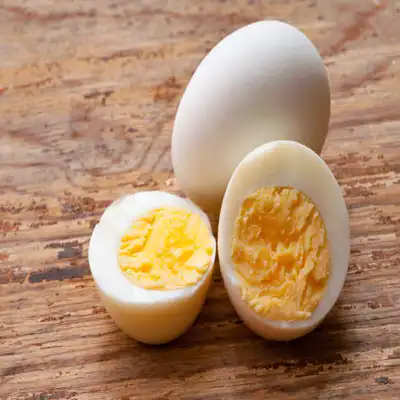How to Make the Perfect Hard Boiled Egg: The Easiest Method and Recipe
Hard boiled eggs aren’t just for salads and Easter. They make a filling snack any time of day. Whether you’re watching your carb intake or just want a quick, nutritious bite that won’t break the bank, hard boiled eggs are a great choice. They are inexpensive, packed with protein and can be eaten as is or used in other recipes. For example, add chopped hard-boiled eggs to tuna salad or egg salad. Use them in deviled eggs or Egg McMuffins (a popular fast food chicken sandwich that features egg as one of the primary ingredients). You can also chop them up to add them to a green bean casserole or potato salad. Fortunately, making hard boiled eggs is easy regardless of if you want to eat them raw or cook them further in another dish. Here’s how to make the perfect hard boiled egg every time…
What You’ll Need:
– Eggs – The number of eggs it takes to make hard boiled eggs will vary depending on the size of the eggs, the size of the pot and the amount of water used. A general rule of thumb, though, is one large egg per person if you’re boiling them in a pot, or two eggs per person if you’re using an electric cooker.
– Water – You’ll need a pot filled with water. The amount of water you need will depend on the size of the pot and the size of the eggs. You want the water to be about an inch or two above the eggs so that when they’re placed in the water, the water will boil and create enough steam to cook the eggs.
– A Timer – You want to make sure you don’t boil the eggs too long or not long enough. A timer is a good way to help you keep track of the boiling time so you can remove the eggs at the exact moment they’re done.
– Tongs – You’ll use tongs to remove and place the eggs in the bowl of cold water once the time is up.
A Trick to Skip the Boiling Process
If you want to skip the boiling process entirely and make hard-boiled eggs without cooking them in water first, there is a trick you can use. This method is often referred to as the “sunshine method” because it’s best done on a sunny day. Make sure you have a sunny and warm day (ideally 80 degrees Fahrenheit or higher) before attempting this method. On the day you want to make the eggs, place the uncovered eggs in a bowl and place the bowl in the sun. The egg should be exposed to direct sunlight for around 10-15 minutes. Once the time is up, remove the bowl from the sun and place the eggs in the refrigerator until you’re ready to eat them. The sun will cook the eggs just like they would if they were in a pot of water. In fact, the bowl might even get a tiny bit hotter than the water in a pot, resulting in slightly cooked eggs.
- How To Make The Best Banana Bread Recipe: The Easiest Recipe You’ll Ever Use
- 3 Outrageously Effective Ways To Lose Weight At Home
- How to Get Robux for Free: 3 Tips and Tricks to Level Up Your Game
- How to Get Your First Passport: A Step-by-Step Guide
- How to Fall Asleep Fast: A Simple Guide to Help You Sleep Better
- How to Draw a Dog: The Easiest Method That Turns Out Perfect Every Time
- How To Cut A Pineapple With Ease – The Beginner’s Guide
The Basic Way to Make Hard Boiled Eggs
- – Gather the ingredients and equipment you need.
- – Put the eggs in a pot filled with water. The water should be about an inch or two above the eggs.
- – Place the pot on a stove and turn the burner to high.
- – Once the water starts to boil, shut off the burner, cover the pot and let the eggs sit for 10-12 minutes.
- – Remove the pot from the stove and use tongs to remove the eggs from the water.
- – Place the eggs in a bowl of cold water for about 3 minutes.
Another Way to Soft-Boiled Eggs
- – Gather the ingredients and equipment you need.
- – Put the eggs in a pot filled with water. The water should be about an inch or two above the eggs.
- – Place the pot on a stove and turn the burner to high.
- – Once the water starts to boil, shut off the burner, cover the pot and let the eggs sit for 3-5 minutes.
- – Remove the pot from the stove and use tongs to remove the eggs from the water.
One Last Thing: Always Use Fresh Eggs
Eggs become less fresh as the weeks go by, and the older they get, the more fragile they become. The membranes inside the eggs start to break down and become less elastic, which can affect the texture and consistency of dishes made with them, including hard-boiled eggs. The older an egg is, the more difficult it is to peel. Fresh eggs are easier to peel and taste better when you’re making hard-boiled eggs. Fresh eggs have firm shells, and the yolk will be round and not sunken in. The best way to tell if an egg is fresh is to smell it. If the egg has a bad smell, it’s bad no matter how long the expiration date is. If you want to make sure you only use fresh eggs when making hard-boiled, use the 1-minute boiling technique. The boiling time for fresh eggs is a minute shorter than for older eggs, making them easier to peel.
